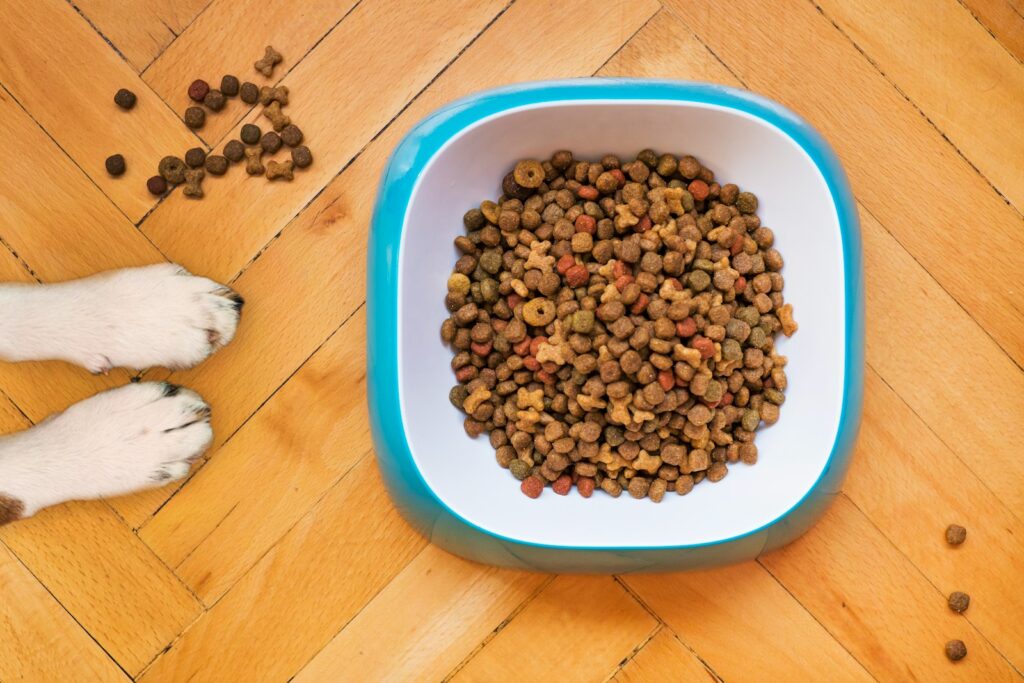
Choosing the right dog food for your German Shepherd puppy isn’t just about filling their bowl; it’s about fueling their growth and health. These pups are known for their intelligence, loyalty, and need for high-quality nutrition to support their rapid development and active lifestyles.
With so many options out there, it can feel overwhelming to pick the best one. But don’t worry, we’ve got your back. We’re here to guide you through the maze of puppy nutrition, focusing on what’s best for your German Shepherd. Let’s dive into the world of proteins, fats, and essential nutrients that will keep your furry friend happy, healthy, and ready to learn new tricks.
Importance of Choosing the Right Dog Food
When you’re raising a German Shepherd puppy, every choice you make impacts their future. It’s no different when it comes to their diet. The right dog food not only fuels their growth but also sets the foundation for a healthy, vibrant life. With the vast array of options out there, picking the best one might seem daunting, but it’s crucial for your furry friend’s development.
Firstly, German Shepherds are known for their active and intelligent nature. This means they require a diet rich in proteins to support muscle growth and repair. However, it’s not just about the quantity of protein but the quality as well. Look for foods that list real meat as the first ingredient, as this indicates a high-quality protein source essential for your puppy’s growth.
Additionally, fats play a significant role in your puppy’s diet. They’re not only a dense source of energy but also necessary for brain development. Puppies, in particular, need a higher fat content to support their rapid growth and high energy levels. However, it’s important to balance it correctly to prevent excess weight gain, which can lead to health issues down the line.
Nutrients are another critical aspect. German Shepherd puppies benefit from a diet fortified with essential vitamins and minerals to support their immune system and overall health. Look for dog food that includes:
- Calcium and phosphorus for strong bone development
- Omega-3 and Omega-6 fatty acids for a healthy coat and skin
- Antioxidants for robust immune health
Lastly, consider your puppy’s unique needs. Every German Shepherd is different, and factors like activity level, health conditions, and even preferences might affect their dietary requirements. Consult with a veterinarian to fine-tune your puppy’s diet, ensuring it’s tailored to support their individual health and growth needs.
Choosing the right dog food for your German Shepherd puppy might take a bit of research and patience, but it’s a worthwhile investment in their health and happiness. By focusing on high-quality proteins, balanced fats, and essential nutrients, you’re paving the way for a lively, healthy adult dog ready to tackle anything from fetch to agility courses with vigor.
Nutritional Needs of German Shepherd Puppies
When caring for German Shepherd puppies, understanding their unique nutritional needs is key to ensuring they grow into strong, healthy adults. These large-breed dogs have specific requirements that differ significantly from those of smaller breeds.
First off, protein is the cornerstone of a German Shepherd puppy’s diet. It’s not just about quantity but quality. High-quality animal protein sources like chicken, beef, or fish should top the ingredient list of your chosen dog food. These proteins support muscle growth and repair, which is crucial for your puppy’s development. For a German Shepherd, a diet with about 22-24% protein is recommended during their growth phase.
However, it’s not all about the protein. Balanced fats are equally vital for your furry friend. Fats provide energy for your active puppy and aid in brain development. But balance is key here. Too much fat can lead to obesity, while too little can affect growth and development. Look for dog food that contains somewhere between 8% and 12% fat content, including essential fatty acids like Omega-3 and Omega-6. These fats contribute to a healthy coat and skin and support overall health.
Moreover, calcium and phosphorus ratios in their food are crucial for bone development and strength, especially for a breed prone to hip dysplasia. The recommended calcium to phosphorus ratio is about 1.2:1. This balance supports strong bone growth without increasing the risk of bone disorders.
Don’t overlook the importance of antioxidants and vitamins in your German Shepherd puppy’s diet. Ingredients rich in vitamins E and C, along with selenium and zinc, can support a robust immune system. These antioxidants help fight off infections and maintain overall health.
| Nutrient | Recommended Amount |
|---|---|
| Protein | 22-24% |
| Fat | 8-12% |
| Calcium | 1.2:1 ratio with Phosphorus |
Remember, every puppy is unique and may have specific needs based on their activity level and health conditions. It’s always best to consult with your vet to tailor your puppy’s diet for optimal health and well-being. With the right balance of nutrients, including proteins, fats, essential vitamins, and minerals, you’ll provide a solid foundation for your German Shepherd puppy’s future.

Key Ingredients to Look for in Dog Food
When you’re prowling the aisles for the perfect dog food for your German Shepherd puppy, the endless options can feel overwhelming. Yet, knowing what key ingredients to scout for can simplify your search and ensure that your pup is on the path to a healthy development.
First and foremost, protein is the cornerstone of your puppy’s diet. Look for foods where the first ingredient is a high-quality protein source like chicken, beef, or fish. These proteins are pivotal for muscle growth and repair, something especially important in a large, active breed like the German Shepherd. Avoid foods where the protein comes primarily from by-products or meal; whole meats or identifiable meat meals are what you’re after.
Next, don’t underestimate the power of balanced fats. While it might seem counterintuitive to feed your puppy fats when you’re trying to keep them lean and healthy, the right fats are crucial for energy and brain development. Aim for a fat content between 8% and 12%, including sources rich in Omega-3 and Omega-6 fatty acids. These not only help with brain development but also keep your puppy’s coat shiny and skin healthy.
| Nutrient | Ideal Percentage |
|---|---|
| Protein | >22% |
| Fat | 8%-12% |
| Omega-3 & 6 | Adequate Amounts |
Another crucial ingredient to watch out for is the calcium to phosphorus ratio, which should ideally hover around 1.2:1. This balance supports proper bone growth and strength, preventing issues like hip dysplasia—a common concern in German Shepherds. Double-check nutrition labels to ensure this ratio aligns with dietary recommendations for large breed puppies.
Let’s not forget the importance of vitamins and antioxidants. Ingredients rich in Vitamins E and C, selenium, and zinc contribute to a strong immune system. Foods that include fruits, vegetables, or supplements to provide these nutrients can play a significant part in your puppy’s health regimen.
Remember, every puppy is unique and may have individual dietary needs or restrictions. It’s always a smart move to consult with your vet when selecting a dog food, ensuring it’s tailored to support your German Shepherd’s growth, health, and happiness without going overboard on certain nutrients.
Best Dog Food Brands for German Shepherd Puppies
When you’re navigating the vast sea of dog food brands, it’s essential to land on one that meets the specific nutritional needs of your German Shepherd puppy. Not all dog foods are created equal, especially for a breed with such distinctive health considerations. Here’s a roundup of top dog food brands renowned for their quality and suitability for your growing puppy.
Royal Canin German Shepherd Puppy: Royal Canin has a formula specifically tailored for German Shepherd puppies up to 15 months old. What makes it stand out is its focus on digestive health, with highly digestible proteins and specific fibers to aid your puppy’s gut flora. This brand also pays attention to immune system support, incorporating antioxidants and vitamins that are crucial during the early stages of life.
Hill’s Science Diet Large Breed Puppy: Designed for large breed puppies like your German Shepherd, this option emphasizes optimal skeletal development. With a precise calcium to phosphorus ratio, Hill’s Science Diet ensures that your puppy’s bones grow strong and healthy. It also features high-quality proteins for muscle growth and DHA from fish oil for cognitive development and eye health.
Purina Pro Plan Focus Puppy Large Breed Formula: Purina Pro Plan offers a blend that’s rich in omega-3 fatty acids and glucosamine which are vital for brain development and joint health. Its formula includes chicken as the first ingredient, catering to your German Shepherd puppy’s need for high-quality protein. Additionally, it contains antioxidants for immune defense and is highly digestible.
Blue Buffalo Wilderness Large Breed Puppy: Inspired by the diet of wolves, an ancestor of domestic dogs, Blue Buffalo Wilderness is packed with protein to help build and maintain lean muscle mass for your German Shepherd puppy. It’s grain-free, catering to puppies with grain sensitivities and includes BLUE’s exclusive LifeSource Bits—a blend of antioxidants, vitamins, and minerals.
- Protein Source: Always look for high-quality protein sources such as chicken, beef, or fish.
- Grain-Free Options: If your puppy has sensitivities, choose a grain-free formula.
- Calcium to Phosphorus Ratio: This should ideally be around 1.2:1 for healthy bone development.
- DHA Levels: For cognitive and eye development, DHA is a key nutrient.
- Digestibility: A good dog food will feature easily digestible ingredients
Tips for Feeding Your German Shepherd Puppy
Understand Their Unique Needs
German Shepherd puppies grow rapidly and have specific nutritional needs to support their development. Protein is the building block of their muscular structure, so ensuring they’re getting enough high-quality protein is paramount. Equally important is the calcium to phosphorus ratio, which should be carefully balanced to support healthy bone growth and prevent issues like hip dysplasia, a common ailment in this breed.
Establish a Feeding Routine
Consistency is key when feeding your German Shepherd puppy. Aim to feed them at the same times every day to establish a routine. This not only helps with their digestive health but also instills a sense of security. Typically, puppies under six months should be fed three times a day, gradually moving to two meals a day as they mature. However, always consult with your veterinarian to determine the best feeding schedule for your puppy’s specific needs.
Measure Their Food
Overfeeding is a common problem that can lead to obesity and related health issues. It’s critical to measure your puppy’s food accurately using a standard measuring cup and follow the feeding guidelines provided on the dog food packaging. Adjust these amounts based on your puppy’s activity level, growth rate, and the advice of your veterinarian.
Remember, a lean puppy is a healthy puppy. You should be able to feel but not see their ribs without a heavy layer of fat.
Transition Foods Gradually
Should you decide to switch your German Shepherd puppy to a different brand or type of food, remember to make the transition gradually over a period of about seven to ten days. Start by mixing a small amount of the new food with the old food, gradually increasing the proportion of the new food while decreasing the old food. This slow transition helps prevent digestive upsets.
Monitor for Food Sensitivities
While German Shepherds are known for their robustness, they can sometimes display food sensitivities or allergies, manifesting as skin irritations, ear infections, or gastrointestinal problems. If you notice any of these symptoms, consult your veterinarian. You may need to transition to a limited-ingredient diet that eliminates common allergens like beef, dairy, wheat, or chicken.
Conclusion
Choosing the right food for your German Shepherd puppy is crucial for their overall health and happiness. By focusing on high-quality protein, the right mineral balance, and a consistent feeding routine, you’re setting up your furry friend for a strong start in life. Remember, every puppy is unique, so it’s vital to keep an eye on how they’re responding to their diet and make adjustments as needed. Don’t forget to check in with your vet regularly to ensure your pup’s nutritional needs are being met. Here’s to a healthy, happy, and energetic German Shepherd puppy by your side!


